Why do we lose our teeth?
We're all born with two sets of teeth, one set of baby teeth followed by another set of adult teeth. Baby teeth start to come in at around six months of age and last until we're about 11 to 12 years old. By this time, most of our baby teeth have been replaced with permanent adult teeth. Sadly, there are no more replacement teeth after this. If you lose an adult tooth, you have to either replace it at the dentist or live with the missing gap. Unfortunately, a vast majority of us end up losing one or more of our adult teeth during our lifetime. Here are some of the most common causes of tooth loss among the adult population:
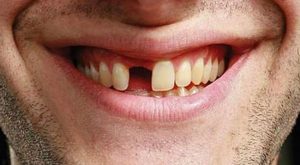
Losing teeth, even if it's only one tooth, impacts your bite, speech, eating capability, and confidence
Gum disease
Gum disease, or periodontal disease, is the top reason for tooth loss among the adult population. More people lose their adult teeth due to gum disease than any other cause. To make matters worse, those suffering from advanced gum disease tend to lose not just one tooth, but rather multiple teeth, sometimes even all of their teeth. Most people who become completely toothless become that way as a result of advanced gum disease. To learn more about gum disease click here.
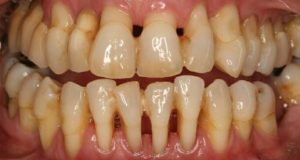
Most people suffering from advanced gum disease will lose multiple teeth
Tooth infection
The second most common cause of tooth loss is cavities that lead up to tooth infection. If you don't fix a dental cavity on time, the cavity bugs deepen until they reach the tooth nerve. This results in a tooth infection which causes severe pain. Your tooth can no longer be fixed via a simple filling. Taking painkillers and antibiotics will only mask the symptoms and won't resolve the issue either. Infected teeth need to be treated with a root canal or you must remove the tooth from your mouth. Otherwise, the infection remains dormant and continues to drain into your bloodstream, the sinuses, and the rest of your body.
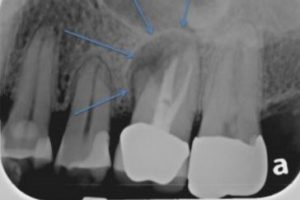
Infected teeth need a root canal treatment or the tooth has to be removed
Accident
You may break your tooth during an accident. The good news is that most broken teeth can be saved by your dentist with a dental filling or a crown. Sometimes the tooth breaks so badly that it is considered non-restorable. If there's not enough tooth structure left to support a long-lasting crown, then you need to remove your tooth. Sadly, these teeth need to be removed from your mouth. This occurs when you break the tooth right at, or slightly below, the gum line. Sometimes your dentist will try to save the tooth with procedures such as crown lengthening, posts, pins, etc. However, if there's not enough tooth structure left to support a crown, your tooth will ultimately fail. It's best to remove these severely broken teeth and replace them with a dental implant or a bridge.
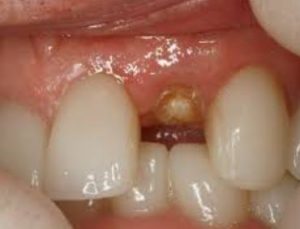
When there's not enough tooth structure left to support a crown you need to remove the tooth
Defective dental restoration
It's not uncommon to lose a tooth as your dental work starts to fail over time. Dental treatments such as fillings, crowns, bridges, and root canals are never guaranteed. Unfortunately, many times a tooth that's been treated starts to fail over time. Sometimes there is a way to save the tooth by doing additional treatments. Other times, there is a widespread infection or the tooth is damaged beyond repair. When this happens, you have no choice but to remove the damaged teeth and if interested, replace them with a dental implant, denture, or bridge. Here are some examples of scenarios where your dental restoration fails causing you to lose the tooth as a result:
- Your crown develops a cavity so bad that there is no more tooth structure to make a new crown
- One or more teeth that are supporting a bridge start to fail because they are overloaded with too much stress
- A faulty root canal starts to leak and becomes reinfected
- A tooth with a crown or veneer breaks right at the gum line, leaving your dentist nothing to work with
Damaged teeth continue to remain vulnerable, even after your dentist fixes them. Just because you received a beautiful new crown does not mean that it will last forever. Recurrent cavities, heavy bite forces, teeth grinding, and gum disease cause dental restorations to fail over time. This could happen even if your teeth have been perfectly restored by a perfectionist dentist. This explains why it's so important to maintain regular check-ups, proper oral hygiene, and protect your teeth against heavy bite forces with nightguards. Otherwise, you risk losing your existing dental work and having to remove these teeth!
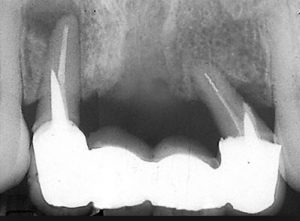
This bridge is failing and you need to remove the bridge as well as the supporting teeth
Impacted wisdom teeth
Wisdom teeth, or 3rd molars, are among the most problematic teeth. Luckily, not everyone has wisdom teeth in their mouth. However, if you do have wisdom teeth, then there's a good chance you'll have to have them removed at some point. If you have enough room to comfortably accommodate these teeth inside your jaws then you get to keep them. Unfortunately, the vast majority of people don't have enough room for their wisdom teeth to fit. As a result, they have to have their wisdom teeth removed. Impacted wisdom teeth cause pain and infection and even lead to teeth crowding. You should remove problematic wisdom teeth as soon as possible. Click here to learn more about wisdom teeth to see if it's time to have them removed.
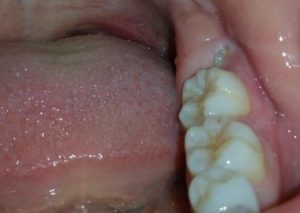
Impacted wisdom teeth cause pain, infection, and teeth crowding
Orthodontic extractions
Sometimes you need to remove teeth in order to get braces. It's not uncommon to have to remove a few teeth to correct your bite during braces treatment. For instance, if your teeth are severely crowded, your orthodontist may recommend removing two or four bicuspid teeth to make room for others. While the idea of losing good teeth may seem disheartening, it's not possible to properly straighten your smile without removing these crowded teeth. Having crooked teeth is not only a cosmetic concern, but it makes it much more difficult to keep your teeth clean and healthy. This can trigger gum disease, lead to interproximal cavities, and even cause infections. So take your orthodontist's advice and sacrifice the extra teeth, because having a straight and healthy smile is definitely worth it!
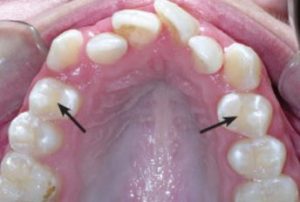
It's not uncommon to have to remove a few teeth when getting braces
Why is it bad to lose our adult teeth?
We only get one set of adult teeth that are supposed to last a lifetime. Losing teeth, even if it's just one tooth, creates many problems down the road. Here are some of the most common issues you could face as you start to lose teeth:
Crooked teeth
When you lose a tooth it causes the neighboring teeth to drift into the gap. The tooth in front will move back. The tooth behind it will move forward. The tooth sitting across in the opposite arch will move down into the gap. As a result, losing one tooth causes a whole bunch of its neighboring teeth to become crooked over the years.
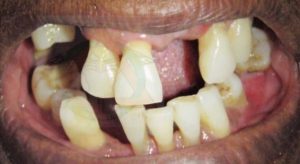
Losing one tooth can lead to losing more teeth over the years
Loss of chewing ability
Your back teeth are used to crush and chew food. Losing a back tooth causes you to put more pressure on the remaining teeth. This negatively impacts your chewing ability by placing unwanted forces on the remaining teeth. Over time, this makes your remaining teeth more vulnerable to fracture and damage.
Increased risk of tooth loss
Most people find it difficult to clean the teeth that are adjacent to a gap resulting from tooth loss. These neighboring teeth are much more susceptible to developing cavities over time.
Reduced confidence
As your remaining teeth drift apart, this creates unsightly gaps between the teeth. This can affect your confidence and self-worth. People with missing teeth, especially those in the front, find themselves smiling less, taking fewer photos, and becoming self-conscious of their smiles.
Tooth loss can have an avalanche effect. Losing just one tooth can lead to multiple teeth loss down the road. Take your missing teeth seriously and look into replacing them. The only exceptions are wisdom teeth and extra teeth which are removed for orthodontic purposes. Talk to your dentist to address your missing teeth before they cause you more problems!
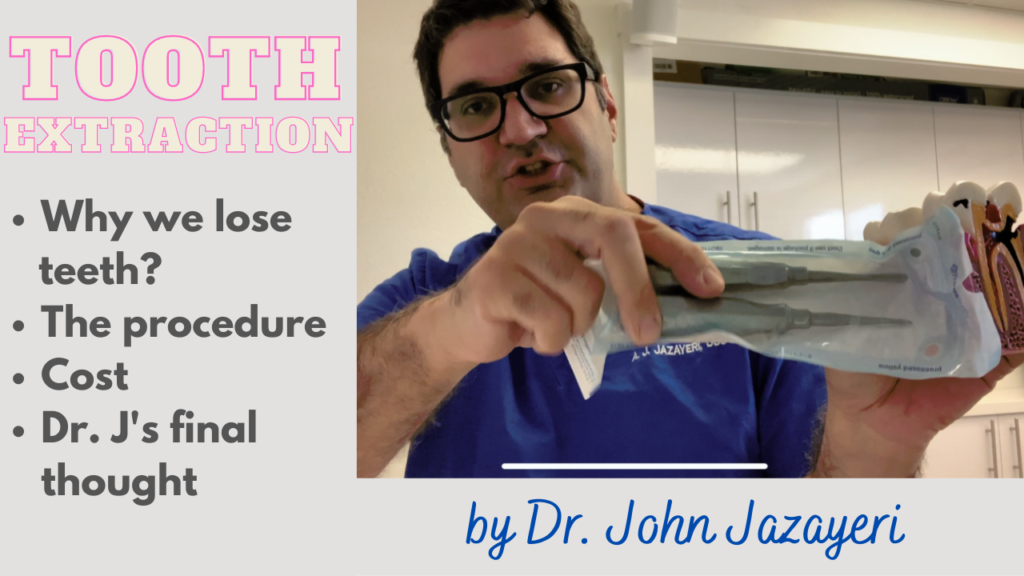
0 Comments